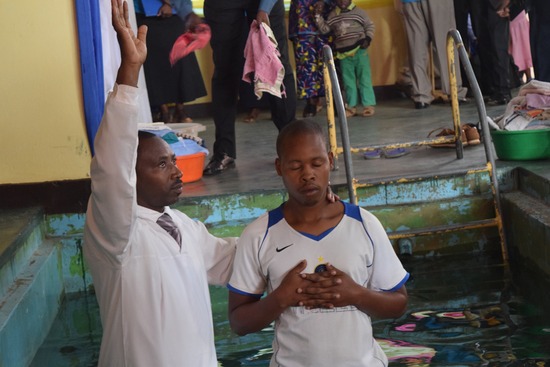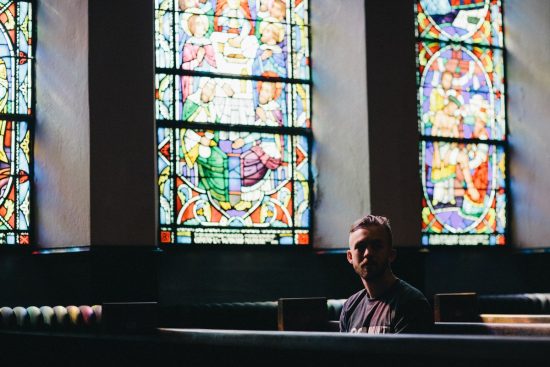Whether you heard about the Seventh-day Adventist Church through a traveling evangelist, during your online searches, or through a loved one or relative, you might be considering joining yourself.
There are a few steps involved in the process of becoming a member of the Adventist Church.
This is a process that happens as the Holy Spirit guides you. It’s best to not rush it. Let the Holy Spirit take you along at His pace for you.
You may not know much about God as you begin this journey, and that’s okay. That’s what it’s all about—learning about Him and His truth. You’ll want to pray often to talk to Him about what you are learning and thinking. And truly, we never stop learning about God and His goodness, no matter how long we have been Christian.
You may also already have a thriving relationship with God, which is wonderful! Coming to Adventism might be the result of God showing you further truth in the Bible.
But how exactly do you go about joining the church? Do you have to go somewhere or fill out a form?
In this article, we’re going to get into that. We’ll lay out the few steps you’ll want to follow, as well as why they’re important and some other common questions.
We’ll dig into:
- The steps to becoming an Adventist Christian
- How you know you’re ready
- Who is involved in the process to become an Adventist
- How long the process usually takes
Let’s start with what you want to know: the steps involved.
The steps to becoming an Adventist Christian

Photo by Nathan Dumlao on Unsplash
As we said before, the Holy Spirit will be your companion as you follow these few steps to becoming a Seventh-day Adventist. It doesn’t matter if you don’t know anything about God or have already developed a relationship with Him.
You’ll want to be careful not to treat these steps like boxes to check off just to say you did them. You want to be sure you resonate with the things you’re learning—do you believe in these things with your heart? To continue with the process, you’ll want to feel truly convicted.
Now let’s take a look at these steps!
Learn about Seventh-day Adventists
The first thing you want to do is learn about Seventh-day Adventists and their beliefs. As we already said, you never want to go into something blind. You want to spend time researching and understanding before making such a big decision.
You can learn about Adventists through other pages on this site or the church’s main website, Adventist.org. You can also read books published by Adventist publications like Pacific Press or the Review and Herald.
While you’re learning, you may also want to have a Bible on hand to study for yourself the things you read.
You can also request information from your local Adventist Church, which leads us to another step of the process.
Find your local church
When you have become familiar with Adventist beliefs, find your local church and attend Sabbath School and services one Sabbath. And this step doesn’t necessarily have to happen after the first step—attending church can help you as you learn about Adventists.
In visiting a church, you can get acquainted with the church members, who are always glad to have visitors! You can also meet the pastor or head elder.
Attending church also allows you to hear other beliefs you may not have come across in your initial reading.
Request Bible studies
The next thing you’ll want to do is request Bible studies. If you’ve attended your local church, you can ask the pastor or head elder, and they will be more than happy to study with you. You could also ask another church member or Bible worker at the church.
Why do Bible studies when you’ve already been learning about Adventism and the Bible?
This is a chance for you to do a deep dive into Adventist beliefs and how they line up with Bible teachings. You’ll go through the 28 Fundamental Beliefs and look at the core doctrines Adventists believe in. Some of these include the Second Coming, the Ten Commandments, and the state of the dead. You’ll also get a sneak peek at the history of the Adventist Church and its founders, like Ellen G. White.
Not only do you get a thorough, sequential study of the Word of God and Adventist beliefs, but you get to do it one-on-one with the pastor or another person studying with you. Here, you can ask any questions you may have. No questions are too silly! The person you are studying with wants you to ask questions because it means you’re thinking and want to know more.
When you finish your Bible studies, there aren’t any tests to “pass” them. They are designed to help you study God’s Word and build your relationship with Jesus Christ, not to pass a test. It is up to you to learn all you can.
Make the commitment

Once you feel you have a good, solid understanding of Adventist beliefs within the Bible, it’s time to officially commit yourself to your new beliefs. This is done through baptism.
Baptism is a public profession of faith—telling everyone openly that you have adopted belief in Jesus through the Adventist understanding of His Word. Baptism is a celebration—a wonderful time in your life.
In the Adventist Church, you’re baptized by immersion. This means you’re dipped totally underwater—the way the Bible instructs us to be.
On the technical side, baptism automatically makes you a member of the Seventh-day Adventist Church. This gives you a say in church matters and allows you to hold positions in the church, like deacon or treasurer.
If you have already been baptized by immersion into another Protestant denomination, you can also choose to make a profession of faith instead of being rebaptized.
A profession of faith is the same idea as baptism: it’s a formal declaration that you believe in Jesus and want to be part of the Adventist Church. You just aren’t immersed in water, like baptism.
Either at the same time or within the next weeks after your baptism or profession of faith, your church will likely have a reading, or public vote, on whether to accept you as a member. Don’t worry about this step: most people are eagerly voted in!
Why these steps are important
Following these steps is important because they help you understand more about the church you’re joining and the community of believers you’ll be a part of.
You’ll get to meet the head of the community—the pastor—and see how the church functions.
You’ll get to see how Adventists put their beliefs into practice daily. Not to mention you’ll get to learn what everything means and figure out the context behind everything you’ve heard or read.
All of these things will help you thrive in your new-found church community. This is why going through these steps is so fundamental.
But do you have to become a member to be a part of the church?
No, it’s not mandatory. But practically speaking, it’s a good idea if you want to be a part of the church to go ahead and become a member.
Logistically, membership helps keeps things organized in the structure of the church and the General Conference, the worldwide representative body of the church. We live in a world of databases and systems, so having a membership makes it easier in church structure.
But most of all, there is something special about membership. It makes a person feel especially connected to a community and prioritize their commitment there. When you become an official member, you are more likely to be involved, and because of your involvement, you’ll likely feel more like a part of that church family.
How you know you’re ready
As we’ve said earlier, there is no magic formula to determine when you’re ready. You don’t have to be a certain age or a certain economic status. People of all ages, from children to high school age to older people join the church, and people of all walks of life and economic status are welcome.
The Holy Spirit works on our hearts in its own time, little bit by little bit, guiding us to the truth as we are ready to receive it.
But it’s important to be sure of a few things before you make the commitment. You’ll want to accept the Lord Jesus as your Savior, and thoroughly understand our fundamental beliefs as the Bible teaches them, as we outlined in the steps above.
And, most importantly, you will want to feel really convicted of these things. You don’t want to become a member just because your spouse or friend did. You must personally want to believe in your heart the Biblical truths shown to you.
Who is involved in the process to become an Adventist
Normally, this will be the pastor, elder, or Bible worker in your area or local church. They will study the Bible with you and answer any questions you have along the way.
But other support can be great too! Any big decision can be a little stressful. If you have any relatives or friends who are Adventists, go to them for emotional support.
Also, new friends you’ve made at your Adventist Church will gladly give you support and help answer your questions. They will help you feel at home as you go through this big transition.
How long the process usually takes
There is no set time for when to complete the process of becoming an Adventist. It isn’t something that happens at the snap of your fingers. It takes time to learn and study everything.
When we’re learning what Scripture says, we are learning about God (John 1:1). Since God has existed forever, even a lifetime of Bible study is not enough to learn everything about Him. An introductory Bible study, like what you’ll take with a pastor, elder, or other trusted church members, will take time.
For everyone, it’s different. Some complete this process in a few weeks. For others, it takes several months or a year. For others, it might take longer. It depends on your pace.
If you’re chomping at the bit, wondering why certain aspects might be taking too long, keep in mind that God knows what’s best for us. In the New Testament, Jesus tells His Disciples that He knows even when a sparrow falls, and a human is so much more important than a sparrow (Matthew 10:29-31).
Let God work at His own pace, and He will do wonderful things in your life.
The important thing is to focus on what you’re learning, not how long it’s taking.
Becoming a Seventh-day Adventist can’t be a decision of a moment. It’s something that can come only after meditative study of the Bible and inner acceptance of the beliefs presented.
It’s about the state of your heart.
The process we discussed helps you get a well-rounded introduction to the new life you’ll find in Adventism through belief in Jesus.
If you want to learn more about the public commitment to Adventism and what it signifies,
Related Articles
More Answers
sam
Test
What the Bible Says About Tattoos (Are They a Sin?)
Only one Bible verse speaks directly to permanent, symbolic markings on the skin. It’s Leviticus 19:28, and it’s one item in a list of ways God told Israel to distance themselves from the pagan practices of the people they lived among.
What Are Pathfinder and Adventurer Clubs?
What are Pathfinder / Adventurer Clubs?Like the boy or girl scouts, Pathfinders and Adventurers learn about nature and life skills. But what makes these clubs special is their purpose to bring young people closer to Jesus. If you’ve wondered about Pathfinder or...
What Is a Seventh-day Adventist Camp Meeting?
Although camp meetings didn’t begin with the Seventh-day Adventist Church, they’re very common to Adventists.
Who Changed the Sabbath to Sunday?
If the Bible never mentions the change of the Sabbath, why do so many today attend church on Sunday?
Do Seventh-day Adventists Believe Only They Will Go to Heaven?
No, Adventists definitely don’t believe they’re the only ones that will go to heaven. As a matter of fact, we don’t believe admittance into heaven is ever based on which church or denomination we belong to. People all over the world from different Christian denominations, religions, and walks of life will be welcomed by Jesus Christ.
How Adventists Developed the Sanctuary Doctrine and What It Means
The sanctuary was a building at the center of ancient Israelite society that gives us a small picture of the original sanctuary, God’s throne room in heaven (Hebrews 8:1-2).
Major Fulfilled Bible Prophecies You Should Know About
Prophets seem like something from novels or movies.
What Do Adventists Believe About the Atonement?
If you’ve spent much time in the Bible books of Leviticus or Numbers, you might’ve noticed the word atonement.
How Adventists Handle Death and Funerals
Most Seventh-day Adventist funeral services are similar to those of other Protestant denominations, such as Methodists, Baptists, or Presbyterians, but you might find a few differences or unique nuances.
What Do Adventists Believe About Faith and Works?
Adventists believe we are saved by faith, which is the belief and trust we have in Jesus Christ to save us from our sins. Jesus, then, enables us to live in harmony with God’s commandments and serve others with love—sometimes referred to as “works.”
What Day Is the Sabbath, and How Do We Know?
The weekly Sabbath is a memorial of God completing the creation of our world. He established this special day of rest and reflection in the first book of the Bible (Genesis 2:2-3).
Does the Adventist Church Have Youth Ministry Programs?
Does the Adventist Church Have Youth Ministry Programs?The Seventh-day Adventist Church has been organizing and operating youth ministry programs since 1879. In our opinion, youth ministry is one of the most important ministries a church can have. Being a tween or a...
8 Pieces of Advice from Ellen White’s Counsel for Families
8 Pieces of Advice from Ellen White’s Counsel for FamiliesFamily—it can be the source of the most wonderful and frustrating parts of life. And it’s in the family that individuals develop their identities and learn the behaviors that either propel them forward or...
Disclaimer
DisclaimerHope for Africa AAAF is committed to keeping this website up to date and accurate. Should you nevertheless encounter anything that is incorrect or out of date, we would appreciate it if you could let us know. Please indicate where on the website you read the...
Privacy Policy
Privacy Policy Your privacy is very important to us. Accordingly, in this policy we outline how we collect, use, communicate and make use of personal information: When accessing the africa.askanadventistfriend.com website, our organization will learn certain...
Accessibility Help & Feedback
Accessibility Help & Feedback If you find any difficulty in accessing the content on our website, you can request it be made available in an alternative format for your accessibility needs. To request information in an alternate format, please contact us. Make...
7 Reasons Why a Day of Rest is Important
We live in a fast-paced world. It seems as if success is measured in how much you can do in a short amount of time. (Extra points for the service or product that is available 24/7).
The Health Benefits of Fresh Air You Should Know About
“When you can’t breathe, nothing else matters,” the American Lung Association tells us. We couldn’t agree more! Breathing in clean air is an essential part of caring for our bodies, which God has given us. Together with other health principles, it promotes optimum physical, mental, and spiritual health.
Judges of Israel and lessons we can learn from them
Times of crisis call for men and women of action. The Israelites, newly settled in the Promised Land, found themselves in those times. As enemy nations attacked and oppressed the tribes, they cried out to God for help. He, in turn, sent them men and women of action—known as judges.
Ellen White’s Visions and Prophecies
The New Testament upholds prophecy as a spiritual gift that will continue to the end of time (Ephesians 4:11–14).
Ellen G. White’s Counsel on College Education
Ellen G. (Harmon) White, a significant co-founder of Adventism, is often known for her practical and spiritual guidance for proper childhood education. But she was also significantly involved in the development of Seventh-day Adventist higher education.
Ellen G. White or the Bible—Which is More Important to Adventists?
The Bible—without a shadow of a doubt—is the most important book. It’s the standard we use to test all other writings, including those of Ellen White.
Do Adventists Worship Ellen White?
Ellen White was a co-founder and leader in the Seventh-day Adventist Church from its beginning. Adventists believe that she had the prophetic gift (Ephesians 4:14; 1 Corinthians 12:28) and passes the biblical tests of a prophet.
Ellen White and the Sabbath
The Sabbath is an important topic in the Seventh-day Adventist Church. It shouldn’t surprise you, then, that Ellen G. White, a co-founder of the church, studied the Bible’s teachings on the Sabbath and wrote large amounts about it.
Are Any of Ellen G. White’s Prophecies Yet to Come True?
Yes. Some prophesied events have yet to happen. Ellen White, a co-founder of the Seventh-day Adventist Church, demonstrated many times over that she had the spiritual gift of prophecy (1 Corinthians 12, 14). Some of her predictions’ timelines have already passed, and those prophecies have been fulfilled.
How does one become a Seventh-day Adventist?
To be a Seventh-day Adventist Christian means to accept Jesus Christ as Lord and Savior. This means to recognize that Jesus alone can save you from sin and death (Savior) and to give Him full authority over your life (Lord and Master).
What Are Adventist Evangelistic Meetings?
The Seventh-day Adventist Church puts a huge emphasis on sharing the gospel through evangelism, or sharing the gospel through preaching, teaching, and testimony. One of the ways we accomplish this is by organizing public events called evangelistic meetings.
Didn’t find your answer? Ask us!
We understand your concern of having questions but not knowing who to ask—we’ve felt it ourselves. When you’re ready to learn more about Adventists, send us a question! We know a thing or two about Adventists.



























